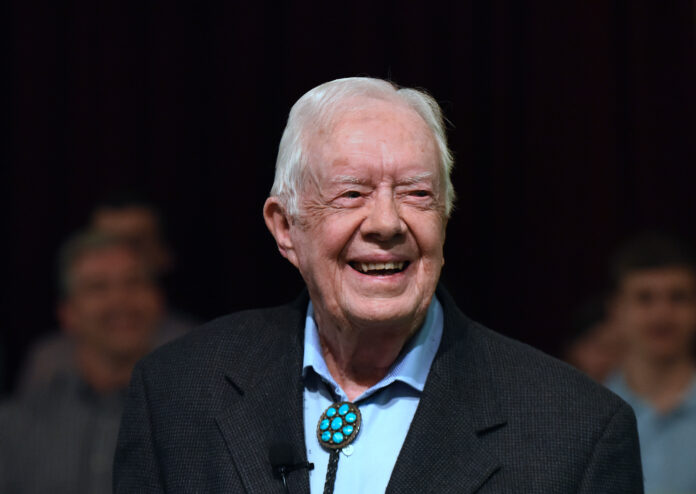Explore the life and legacy of Jimmy Carter, the 39th President of the United States, in this in-depth article. From his humble beginnings to his successful presidency, learn about the impact he had on the nation and the world.
Jimmy Carter is a name that has become synonymous with integrity, compassion, and service. As the 39th President of the United States, he was known for his humble demeanor, his dedication to public service, and his commitment to promoting peace and equality around the world. In this article, we will delve into the life and legacy of this remarkable leader, exploring his early years, his presidency, and the impact he continues to have on our world today.
Also, Read This: Picture-mode-on-WhatsApp-for-ios
Early Life and Career
Jimmy Carter was born in Plains, Georgia, on October 1, 1924. He grew up on a farm and attended public schools in the area before going on to attend the United States Naval Academy in Annapolis, Maryland. After serving in the Navy for several years, he returned to Georgia and began a successful career in politics. In 1971, he was elected Governor of Georgia, serving in that role for four years before running for President.
From Peanut Farmer to Governor
As a young man, Jimmy Carter worked on his family’s peanut farm in Plains, Georgia. He later joined the Navy and served on submarines, rising to the rank of lieutenant. After his military service, he returned to Georgia and got involved in local politics, serving on the Sumter County Board of Education and the Georgia State Senate before being elected Governor in 1971.
Presidential Campaign
In 1976, Jimmy Carter launched his campaign for President of the United States. He was a relative unknown at the time, but his humble demeanor and commitment to public service quickly won over voters. He campaigned on a platform of honesty, integrity, and a commitment to promoting peace and human rights around the world. His campaign was successful, and he was elected President in November of that year.
The Presidency of Jimmy Carter
Jimmy Carter’s presidency was marked by many successes, as well as some challenges. He was known for his commitment to human rights and his efforts to promote peace around the world, but he also faced criticism for his handling of the economy and his foreign policy.
Domestic Policy
As President, Jimmy Carter was committed to promoting social justice and equality. He signed into law several pieces of legislation that protected the rights of minorities and women, including the Civil Service Reform Act, the Pregnancy Discrimination Act, and the Refugee Act. He also created the Department of Education and the Department of Energy, demonstrating his commitment to education and environmental protection.
Foreign Policy
Jimmy Carter was a strong advocate for peace and human rights around the world. He brokered the Camp David Accords between Egypt and Israel, which helped to bring an end to the long-standing conflict between the two nations. He also established diplomatic relations with China and worked to improve relations with the Soviet Union. However, his handling of the Iran hostage crisis was widely criticized, and many believed it contributed to his defeat in the 1980 election.
Jimmy Carter’s Legacy
Despite some of the challenges he faced during his presidency, Jimmy Carter’s legacy continues to be one of service, compassion, and commitment to promoting peace and equality. After leaving office, he continued to be involved in humanitarian work, founding the Carter Center and working on issues such as disease prevention, conflict resolution, and human rights.
Humanitarian Work
The Carter Center, founded in
Who was Jimmy Carter?
Jimmy Carter was the 39th President of the United States, serving from 1977 to 1981. He was also a successful businessman, farmer, and naval officer before he entered politics.
What were Jimmy Carter’s major accomplishments as President?
As President, Jimmy Carter’s major accomplishments include brokering the Camp David Accords between Egypt and Israel, signing several pieces of legislation that protected the rights of minorities and women and establishing diplomatic relations with China.
What was Jimmy Carter’s foreign policy like?
Jimmy Carter’s foreign policy was marked by a commitment to promoting peace and human rights around the world. He worked to improve relations with the Soviet Union and brokered the Camp David Accords, but his handling of the Iran hostage crisis was widely criticized.
What has Jimmy Carter done since leaving office?
After leaving office, Jimmy Carter founded the Carter Center, which works on issues such as disease prevention, conflict resolution, and human rights. He has also been involved in several humanitarian efforts, including working to eradicate diseases in Africa and building homes for low-income families.
What is Jimmy Carter’s legacy?
Jimmy Carter’s legacy is one of service, compassion, and a commitment to promoting peace and equality. He is widely regarded as one of the most humble and honest Presidents in U.S. history, and his dedication to humanitarian work has inspired many people around the world.

